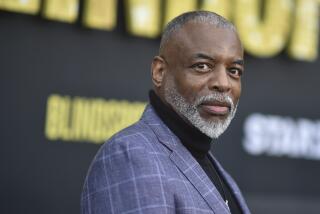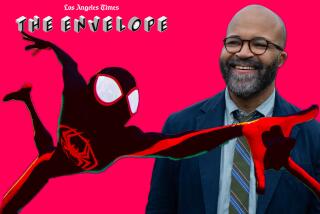A New ‘Roots’ in the Holiday Spirit
- Share via
Fiddler: Freedom, is that something that make a man want to risk his life?
Kunta: Fiddler, it’s a chance to be who you was born to be. And you don’t have to ask no white man or nobody for nothing.
--A scene from “Roots: The Gift”
They’re back. After 11 years, just in time for Christmas, those legendary characters from the landmark miniseries “Roots,” based on Alex Haley’s multigenerational novel, have returned--not in reruns, but in a new two-hour movie, “Roots: The Gift.”
There’s Fiddler, the old slave, played again by Louis Gossett Jr., and Kunta Kinte, the strong, rebellious young African who had been dragged in chains onto a slave ship and taken to the same Virginia plantation as Fiddler, reprised by LeVar Burton.
There are new faces, too, in this David L. Wolper production (withWarner Bros. Television), including Cletus Moyer (Avery Brooks), a “free man of color” who stirs up yearnings for freedom in Kinte and conflict in Fiddler; Edmund Parker Jr. (Shaun Cassidy), a neighboring plantation owner’s son, now a Harvard man and an abolitionist, and Hattie Carraway (Kate Mulgrew), a slave bounty hunter.
The story--airing Sunday at 9 p.m. on ABC--begins when Fiddler and Kinte travel with their owner, Dr. Reynolds (Jerry Hardin), to the neighboring Parker plantation to help with Christmas preparations and there find themselves involved in a mission to lead a group of slaves across a river to freedom on Christmas Eve.
And the rest, those involved in this newest “Roots” movie hope, will become television history, repeated year after year in the holiday season, much the way the movie of Dickens’ “A Christmas Carol” is.
Chronologically, “Roots: The Gift” takes place in 1775, seven years after Kunta Kinte’s attempted escape and savage beating in which he was forced to say his slave name, Toby. In TV terms, the story falls between the second and third segments of the original miniseries.
According to Haley, the genesis of the TV movie came about a year and a half ago, when Wolper, who had been executive producer of the original miniseries, called him and said, “We need a black Christmas story, because there’s none on television.”
“I told David, ‘This is pure coincidence. I’ve been making notes about a Christmas story to involve the characters of Kunta Kinte and Fiddler.’ ”
Haley’s new book, “A Different Kind of Christmas,” grew out of those same notes, said Wolper’s son, Mark, who produced “Roots: The Gift.” Haley “gave us the story for the script and then he decided to take that same story, adapt and modify it for the book,” he said. “The book and the TV movie are only similar in essential story outlines. The book has altogether different characters.”
On a cool, windy May morning in a barren stretch of land near Thousand Oaks, Gossett was in his cozy trailer drinking strong coffee and awaiting the call to the next scene. Across a dirt road, Burton was on call in another trailer. The cast and director Kevin Hooks (son of actor Robert Hooks) were scheduled to leave the next day for two weeks of filming in Nashville.
“This is a wonderful, magical deja vu for me,” Gossett said, stretching out long legs that almost seemed to reach the trailer door. “Fiddler is an international folk hero. Most actors kind of dream of doing at least one great character in their careers, and I’m fortunate enough to have two--Sgt. Foley (the character of his Oscar-winning performance in “An Officer and a Gentleman”) and Fiddler (which won him an Emmy).
“David Wolper talked to me last season at the Laker games during the NBA playoffs about this special,” Gossett said, “and I said, ‘Absolutely.’ . . . There’s a brand new audience, many of whom have never seen the original because they were too young.
“Fiddler had been the first black man that Kunta Kinte met in America,” Gossett said, warming to the story. “The famous line is, ‘You are no more in Africa, you are in America now.’ And the relationship flowed along the lines of: Now you are going to have to behave yourself, you are a slave, and there’s no better life, so you have to adjust.
“In this particular script, Kunta Kinte’s bottom-line instinctive search for freedom makes Fiddler curious: What is this freedom? And why do you want it so much, and why do you risk your life for it? And when this freed black man shows up, and they beat him, it brings up a fear in Fiddler. ‘No! I’m doing well enough where I am to get to a ripe old age; I am happy, I’m healthy, I get sleep when I want, I eat what I want, and I got a good life, and you (Kinte) better learn it; otherwise you’re not going to get as old as me.’
“And Kunta Kinte says, ‘Yeah, but across that lake there was freedom. . . .’ And somewhere along the line Fiddler catches that feeling.”
When Gossett first got the Fiddler role a dozen years ago, “I was doing pretty good. It was maybe just near the end of the black exploitation pictures--none of which I did.”
He laughed. “Most of those major parts for the first three hours of ‘Roots’ I didn’t get--which kind of left a bad taste in my mouth that I wasn’t even considered for them. Later on, (the producers said) ‘Oh, right, Lou ! Let’s see if he could play Fiddler.’
“Now Fiddler at the time was only 11 lines long,” Gossett said, “but when we first started working, they started to realize the importance of the relationship between Fiddler and Kunta Kinte. And then good fortune took over. And I’d get another hour and another hour.”
Ask LeVar Burton what the role of Kunta Kinte has meant to him and the answer is immediate. “The most obvious response,” said the 31-year-old actor softly, “is that as a result of ‘Roots,’ I have a career.”
Burton was 19 and on a scholarship at USC when he went to audition for the role. At the time, he said, he was also the only black living on fraternity row. He was a boarder at a frat house.
“Kunta--he’s part of the American culture, and in fact he’s part of the worldwide consciousness,” Burton said, “and it’s a great honor to have contributed to that. . . . I’m grateful I’ve had the chance to breathe life into this guy.
“My image of Kunta has always been and always will be that of the proud Mandinka warrior. So we are three years into his life in America, and more than anything else, I did not want for us to portray Kunta in this project as having assimilated so much into his new life.”
Burton, who currently stars as Lt. Geordi LaForge in the TV series “Star Trek: The Next Generation,” said that before he agreed to reprise the role he wanted to make sure that the image of his character was enhanced.
“Kunta and Fiddler are as close to black American folk heroes as we have,” Burton said, “and my feeling was, if we were going to do yet another treatment of their lives, it would be really important to advance their image, rather than to do something of an exploitative nature, perhaps innocently, inadvertently. To detract from what had come before would have been a major mistake.”
At first, Burton said, “I did not feel there was enough of him (in the script) as the proud warrior, that yes, he’s been here three years, and he’s learned to survive here, but he hasn’t forgotten who he is. The character that I read on the pages of the first draft is not the Kunta I knew.”
Even in mid-production, he said, they were “still honing, still getting rid of the extraneous. But what’s essential when we open up this window, we see these two men and their relationship as having grown.”
Five years ago, Burton said, he would not have been ready to do another “Roots” episode.
“I wouldn’t have been interested in it, because I would have been too close to it. . . . I have been hosting a children’s television series for six years (‘Reading Rainbow’ on PBS). I have fans, people who know who I am, but who never heard of ‘Roots.’ They weren’t even born when ‘Roots’ aired the first time.”
Life is “so full cycles,” Burton added, “and an 11-year cycle is a powerful one. It’s half a generation.”
More to Read
The complete guide to home viewing
Get Screen Gab for everything about the TV shows and streaming movies everyone’s talking about.
You may occasionally receive promotional content from the Los Angeles Times.






